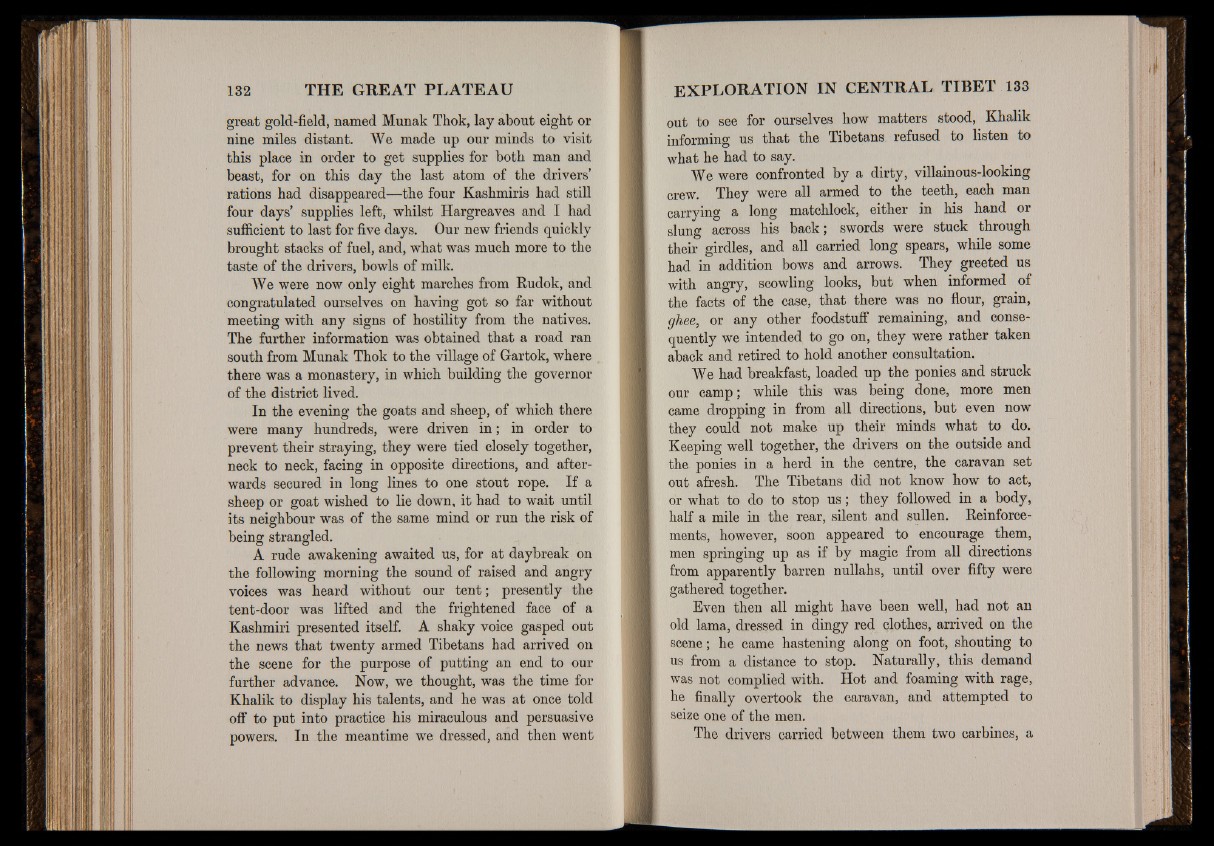
great gold-field, named Munak Thok, lay about eight or
nine miles distant. We made up our minds to visit
this place in order to get supplies for both man and
beast, for on this day the last atom of the drivers’
rations had disappeared—the four Kashmiris had still
four days’ supplies left, whilst Hargreaves and I had
sufficient to last for five days. Our new friends quickly
brought stacks of fuel, and, what was much more to the
taste of the drivers, bowls of milk.
We were now only eight marches from Rudok, and
congratulated ourselves on having got so far without
meeting with any signs of hostility from the natives.
The further information was obtained that a road ran
south from Munak Thok to the village of Gartok, where
there was a monastery, in which building the governor
of the district lived.
In the evening the goats and sheep, of which there
were many hundreds, were driven in ; in order to
prevent their straying, they were tied closely together,
neck to neck, facing in opposite directions, and afterwards
secured in long lines to one stout rope. If a
sheep or goat wished to lie down, it had to wait until
its neighbour was of the same mind or run the risk of
being strangled.
A rude awakening awaited us, for at daybreak on
the following morning the sound of raised and angry
voices was heard without our tent; presently the
tent-door was lifted and the frightened face of a
Kashmiri presented itself. A shaky voice gasped out
the news that twenty armed Tibetans had arrived on
the scene for the purpose of putting an end to our
further advance. Now, we thought, was the time for
Khalik to display his talents, and he was at once told
off to put into practice his miraculous and persuasive
powers. In the meantime we dressed, and then went
out to see for ourselves how matters stood, Khalik
informing us that the Tibetans refused to listen to
what he had to say.
We were confronted by a dirty, villainous-looking
crew. They were all armed to the teeth, each man
carrying a long matchlock, either in his hand or
slung across his back; swords were stuck through
their girdles, and all carried long spears, while some
had in addition bows and arrows. They greeted us
with angry, scowling looks, but when informed of
the facts of the case, that there was no flour, grain,
ghee, or any other foodstuff remaining, and consequently
we intended to go on, they were rather taken
aback and retired to hold another consultation.
We had breakfast, loaded up the ponies and struck
our camp; while this was being done, more men
came dropping in from all directions, but even now
they could not make up their minds what to do.
Keeping well together, the drivers on the outside and
the ponies in a herd in the centre, the caravan set
out afresh. The Tibetans did not know how to act,
or what to do to stop u s ; they followed in a body,
half a mile in the rear, silent and sullen. Reinforcements,
however, soon appeared to encourage them,
men springing up as if by magic from all directions
from apparently barren nullahs, until over fifty were
gathered together.
Even then all might have been well, had not an
old lama, dressed in dingy red clothes, arrived on the
scene; he came hastening along on foot, shouting to
us from a distance to stop. Naturally, this demand
was not complied with. Hot and foaming with rage,
he finally overtook the caravan, and attempted to
seize one of the men.
The drivers carried between them two carbines, a